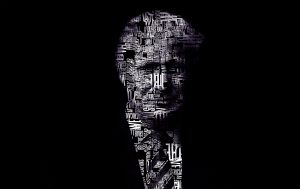Can A.I. Be Funny? This Troupe Thinks So.

Good morning. It’s Thursday. Today we’ll look at a New York-based comedy group that is using artificial intelligence to generate jokes. And we’ll bring you highlights from an interview with former Mayor Bill de Blasio and his wife, Chirlane McCray, on their separation.
Artificial intelligence has infiltrated numerous industries, including health care, education and even the world of astrology. Now, it is making its way into the New York comedy scene.
ComedyBytes, a group of comedians who call themselves an “A.I. comedy collective,” is putting on shows in New York City that feature A.I. improv teams, rap battles, music videos and even a human-versus-artificial-intelligence roast battle.
The group — which includes comedians who have been featured on HBO, Comedy Central and “This American Life” — will perform on July 19 at Crystal Lake, a bar in Williamsburg, Brooklyn.
Eric Doyle, a co-founder of the group and a comedian who uses the stage name “Doyle,” and Erin Mikail Staples, a comedian and the group’s event producer, reflected on how the group uses artificial intelligence to shape how people laugh. Their answers were edited for brevity.
What is an A.I. comedy collective?
Eric Doyle: It’s a group of comedians who are all interested in using various A.I. tools out there to create new entertainment experiences. That’s really our vision with ComedyBytes: to evolve the art of comedy by producing completely new entertainment experiences, and the way we do that is with A.I. tech.
What are some of the A.I. tools the group uses?
Doyle: We use ChatGPT to generate and curate roast jokes. Not all of them are perfect, but I’d probably say maybe 10 to 20 percent of them make it to the show.
And we also use tools like Midjourney, which you can give text prompts to, and then they generate back A.I.-generated images. Wonder Dynamics — we have music videos where we can insert different A.I. animations and figures into real live action footage. We use ElevenLabs to create our A.I. comedian voices throughout the show, and we use a tool called D-ID to help generate some of our avatar faces, our A.I. comedian faces that we have in the show that are projected onto a big screen behind the various performers.
What are some of the prompts that you feed to these tools to get what you want for the shows? Is that something that happens during the shows or is it part of preparation?
Doyle: It’s part of preparation. Usually the prompts will center around various facts about a comedian. For example Joe Smith, just making up a name, lives in Brooklyn. He has three brothers and sisters. He’s a basketball player. He went to college at SUNY Purchase, or whatever those facts might be. And then we give instructions to ChatGPT to create roast jokes based on these facts. And we will train ChatGPT also to do it in a certain style of comedian.
What’s the format of the show?
Doyle: In Round 1, we have humans roasting machines and machines roasting humans in general. And then Round 2 is a little more specific on whichever human comedian we have roasting the specific A.I. celebrity and vice versa. And then Round 3 is great because it’s actually the human comedian versus an A.I. version of him or herself.
Has either of you battled the A.I.?
Staples: I am proud to say that I have successfully beat the A.I. all three rounds. Battling myself was actually the hardest. The celebrity guest that I had was Elizabeth Holmes. I work in tech myself during the day and kind of obsessed over the whole Theranos story, so it was really fun to be able to battle. But I will say that last round was surprisingly difficult.
Say more about why it was difficult.
Staples: It got a lot more personal than I thought — not in a bad way, but I was not expecting it to be so pointed. There was a lot of like, “Your code isn’t even that good.” I’m like, “Oh, man, that was spicy.” I’ll be the first to say that I discredited a lot of the A.I. innovations. When they were coming out, I was kind of skeptical that it could generate good comedic content. As a comedian or a creator, you spend so much time editing and refining, and it’s a little bit frustrating how fast it can come up with good content or decent content.
The New York comedy scene is so competitive. What has the reaction from audiences been?
Doyle: I mean, overall, they seem to really like it. I think it’s such a novel idea, and what we’re doing with these tools is very creative and innovative. I think audiences really like seeing shows that are kind of doing new things. I think audiences are also a little more forgiving because it is such an experimental format.
Staples: We’re actually attracting a slightly different audience, and we’re expanding the audience that would traditionally come to a New York comedy show. We are seeing some tech folks; some folks in the venture capital world who are working in A.I. or investing in A.I. by day come to the shows out of curiosity. That’s been really cool to see.
Weather
Enjoy a mostly sunny day with a high near 90. The evening is partly cloudy with temps in the low 70s.
ALTERNATE-SIDE PARKING
In effect until Aug. 15 (Feast of the Assumption).
The latest Metro news
Revelations from the de Blasio-McCray interview
Our colleague Matt Flegenheimer’s interview with Bill de Blasio and Chirlane McCray was a must-read story among New York City politics watchers. The news, of course, was that the former mayor and his wife were separating after nearly three decades of marriage. The interview, which lasted nearly three hours, elicited numerous notable revelations. Among the highlights:
•Mr. de Blasio and Ms. McCray are not planning to divorce but do intend to date other people. They will do so while continuing to share their home in Park Slope, for now.
•Mr. de Blasio’s tenure as mayor took a toll on their relationship, they acknowledged. “Everything was this overwhelming schedule, this sort of series of tasks,” Mr. de Blasio said. “And that kind of took away a little bit of our soul.”
•Ms. McCray viewed her husband’s short-lived presidential run with skepticism, describing it as “a distraction.” Mr. de Blasio did not wholly disagree. “Kind of true,” he said in the interview. “Point for Chirlane.”
•At times during their marriage, Mr. de Blasio dwelled on the fact that Ms. McCray had earlier identified as a lesbian. “There was a part of me that would at times say, ‘Hmmm, is this like a time bomb ticking? Is this something that you’re going to regret later on?’” he said. “So I always lived with that stuff.”
METROPOLITAN diary
Delicious
Dear Diary:
Some years ago, I took a cab to Second Avenue and Eighth Street. The cabby told me it was where the egg cream had been invented. Then he parked his cab, took me inside and treated me to that delicious drink.
— Karen Allison
Illustrated by Agnes Lee. Send submissions here and read more Metropolitan Diary here.




